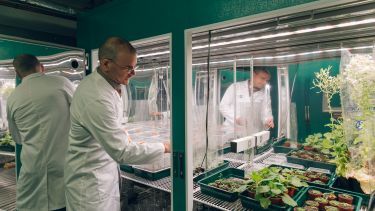Sheffield, United Kingdom
March 22, 2021
The University of Sheffield Institute for Sustainable Food has identified a way to commercialise ‘priming chemicals’ that can be used as a crop protection technology to boost the immune system of plants.
-
University of Sheffield Institute for Sustainable Food to commercialise priming chemicals that can be used as a viable crop protection technology
-
Priming chemicals boost the immune system of a plant and offer long-term protection against pests and diseases
-
Using priming chemicals will help the agricultural sector reduce reliance on harmful pesticides
-
The Institute hopes their advances in methods to minimise effects chemical primers on plant growth will help in future adoption by the agricultural sector
The University of Sheffield Institute for Sustainable Food has identified a way to commercialise ‘priming chemicals’ that can be used as a crop protection technology to boost the immune system of plants.
The chemicals increase the resistance of plants and enable a faster and stronger defence reaction against pests and diseases. This alternative crop protection strategy offers long-term immune protection for plants, unlike more popular pesticides.
A large proportion of global crop yield is lost to plant pests and diseases every year and whilst pesticides help to reduce these losses, there is increasing worry about their use in agricultural food products and the effect they have on the environment.
Despite concerns about pesticide usage, both on the environment and to human health, it has actually increased in most European countries due to increased disease pressure and resistance developing to the most common pesticides.
“So there is an urgent need for alternative and effective crop protection strategies that allow us to reduce, and ultimately eliminate, our reliance on pesticides. These strategies must not only be economically feasible for farmers, but also address consumer concerns about environmental sustainability and the potential health risks of chemical residues in our food.”
Professor Jurriaan Ton
Professor of Plant Environmental Signalling at the University of Sheffield's Department of Animal and Plant Sciences

So far, chemical priming agents have not reached their full economic potential due to the undesirable effects they have had on plant growth and crop yield, but the Institute for Sustainable Food has found ways to exploit methods for producing chemical primers that minimise any effects on plant growth.
The research has also identified hydroponic cultivation of vegetables in greenhouses or vertical urban farms as the most suitable commercial environments to exploit priming chemicals, because of their vulnerability to outbreaks of pest and disease and the fact that these types of systems also allow for careful dosing of the priming chemicals.
Professor Ton, added: “As well as using the chemical primers to coat seeds for planting, or adding to hydroponics systems we will also investigate which crop varieties that have the best response to these priming chemicals. This will allow crop breeding companies to select for varieties that have the best immune response to the most pervasive pests and diseases affecting farming today.”
The research will now be used to develop a commercially viable product for the agricultural sector. For more information about the results so far or to express interest in collaborating on the development of plant priming into a crop protection technology, please contact the Institute of Sustainable Food ChemPrime team.
Additional information